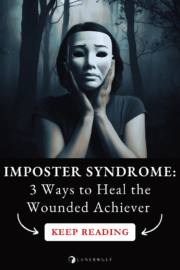You have a secret – a hidden, dark secret:
Deep down, you’re a fake, a fraud, and a liar.
At least, that’s how you feel.

Soul Work Compass Course:
Drifting through life without direction is exhausting. If you feel paralyzed by confusion or self-doubt, this course is your map out of the fog. We guide you safely through your inner darkness to uncover your true needs, values, beliefs, wounds, and sacred gift. Turn your confusion into crystal-clear direction and find your True North today.
If you can relate to the fear of being “found out” that you’re not as smart, competent, successful, wise, or even as spiritual as others think you are, you’re in good company.
Studies have shown that up to 80% of people have felt imposter syndrome at least once in their life.
And while there’s a lot of typical advice out there on developing ‘positive self-talk’ and keeping a ‘success file’ – which can help – I’m taking a different route.
As someone who has experienced imposter syndrome to an excruciating degree, I’m going to share what has actually helped me.
Not only that, but I’m going to argue that overcoming imposter syndrome can actually be simpler than you think. It all depends on your perception.
Table of contents
What is Imposter Syndrome?

Imposter syndrome, also known as impostorism, is the experience of believing that one is secretly an incapable, fraudulent, and deficient phony.
Those with imposter syndrome believe that their success or status is due to luck or other external factors, and not their own hard work or virtuous qualities.
Want to get LonerWolf at the top of your Google search results?
13 Signs You’re Suffering From Imposter Syndrome

How many of these signs can you relate to?
- You secretly feel like a fraud
- You have unrealistically high standards for yourself (perfectionism)
- You struggle to accept praise from others
- You believe that your achievements are due to external factors only
- You feel chronically inadequate and “not good enough”
- You tend to overwork as a result of feeling unworthy
- You’re scared of secretly being “found out” that you’re not all you seem to be
- You may sabotage your success via procrastination or avoidance
- You’re self-effacing and you tend to minimize yourself around others
- You feel like you don’t belong around people who share similar values, work, or accomplishments
- You decline new opportunities out of fear and feelings of inadequacy
- You’re constantly comparing yourself to others
- You feel intensely nervous being watched, judged, or evaluated in any way
My Experience With Imposter Syndrome

True story: whenever anyone asks me “what I do” in real life conversations, I feel a pit of dread and anxiety emerge within me.
The immediate subconscious thought that fires through my brain is “How do I evade the question and downplay what I do?”
“I don’t want them to judge me and see that I’m a big old fraud who isn’t spiritual enough to be doing the kind of work that I do.”
And there’s some level of truth to these feelings.
No, I’m not the most spiritual person in the world. I haven’t got a perfectly high vibrational diet. I don’t do juice cleanses. I don’t go on meditation retreats. I don’t travel to exotic lands to engage in special rituals. I haven’t backpacked around India or visited gurus.
Heck, I don’t even like being around most spiritual people (at least the stereotypical mala-bead-wearing-boho-yoga-crystal kind).
I’m more of a down-to-earth spiritual person who likes nature walks, reading books, journaling, and other everyday practices.
Another thing that triggers my imposter syndrome is comparing myself to others in the spiritual field. Like, why am I not offering 1:1 consultations, retreats, or things like that?
The inner imposter tells me, “You should be doing these. You should be more accomplished and visible than what you are. It has been over ten years for Christ’s sake.”
Would you like to save this?
Your information will never be shared.
But then, a wiser and more compassionate part of myself realizes that I’m a major introvert. I dislike group settings, and therefore find the idea of hosting a retreat horrid. I don’t attend retreats, so why would I want to host one? Um, no thank you.
I’ve also been asked many times through the years whether I provide 1:1 sessions. The answer is no, I don’t. Sometimes I offer personal tarot readings and I also provide weekly intuitive guidance for my beloved LonerWolf supporter members. But I’m not in a place to physically, mentally, or emotionally offer anything else.
I’m not a therapist – and neither do I want to be (mad respect to those who regularly work directly with traumatized and suffering people).
I’m a writer, educator, and intuitive guide, and I like the kind of healthy distance that creates. Who knows, maybe one day that will change? Maybe I’ll change? Maybe not.
But the greatest joy for me comes through being a creator, healer, and alchemist through the written word. And I like it that way.
The Hidden Gift of Imposter Syndrome

Yes, imposter syndrome can trick you into believing false things about yourself (aka., being “unworthy” or living as a “fraud”) and therefore be negative and destructive.
But the gift hidden is that it can also present you with inconvenient truths about yourself, offering you an invitation to find more self-acceptance and self-sovereignty.
Take the example I offered above – yes, I’m not a stereotypically “spiritual person.” But that’s what makes my work more accessible, grounded, and down-to-earth.
No, I don’t offer zoom calls or in-person sessions like other people in this field. But that’s because I’m not called to do that. Instead, I’m called to offer a light in this world through writing and intuitive guidance.
Imposter syndrome is obviously unhealthy. But as psychoanalyst Carl Jung once pointed out, “the shadow is ninety percent pure gold.”
In other words, this shadow quality of believing that we’re a phony deep down can actually possess hidden goodness and possibilities for heightened self-knowledge.
So what is the gold hidden within your imposter syndrome shadow? You might like to take some time contemplating that question.
Another question you can ask yourself is, “What inconvenient truth might imposter syndrome be presenting me that I now have the rare opportunity to embrace radically?”
To find that hidden truth, you first need to do a bit of clarification, known in spiritual alchemy as Calcination, Dissolution, and Separation – or disidentifying from this energy and becoming more self-aware.
The Shadow of Worthiness: 3 Ways of Overcoming Imposter Syndrome

Again, I’m not interested in taking the traditional route when it comes to healing imposter syndrome.
For over 12 years, we've poured our hearts into creating free content on this website. Unlike many platforms, we believe this guidance should be accessible to everyone. If this post empowered you in any way, please consider making a donation to keep us going. Any amount (one-time or ongoing) makes a huge difference.
There are enough articles and videos out there already offering regurgitated advice on “practicing positive self-talk,” separating feelings from facts, and so on.
The problem with this approach is that if you don’t go to the root of imposter syndrome, all of these surface actions will make very little difference.
So here’s what I recommend instead on overcoming imposter syndrome little by little, using the first three stages of spiritual alchemy:
1. Break it Down

In spiritual alchemy, the first stage of transformation is known as Calcination, which involves identifying and breaking down the parts of ourselves that are in the way of our happiness.
To do this with imposter syndrome, I strongly recommend getting to know this inner shadow:
- Write about how it appears in your life
- Explore how it makes you feel
- Go into depth examining all the thoughts, behaviors, and missed opportunities it has created
To move through and transmute this energy, you need to be intimately aware of how it appears in your life. So face the pain, name it, and feel it.
2. Disidentify With It

This is known in spiritual alchemy as Dissolution, which is the second stage of transformation where we learn to melt and dissolve our false identifications.
When it comes to imposter syndrome, you need to become aware of what part within your psyche is responsible for these feelings and patterns.
Various forms of psychological theory call these parts ‘subpersonalities’ and ‘complexes’ – but here I’ll just stick with the internal family systems language of ‘parts.’
To make it easy for you, I’ve identified the likely culprit (but feel free to double check within yourself). The part usually responsible for imposter syndrome is The Wounded Achiever.
At some point in life, due to childhood trauma, family expectations, conditioning, or some other reason, you developed a hyperactive Achiever part.
This aspect of you overcompensates for its feeling of inner inadequacy by overworking and trying to ‘prove’ that it’s worthy and therefore lovable.
But the tragic catch is that it never can find that feeling of worth because it’s constantly seeking validation and approval from the outside, yet feels fundamentally flawed inside.
The solution here is to recognize that the Wounded Achiever who is responsible for your feelings of imposter syndrome is a PART of you but is NOT the whole of you.
In other words, you need to dissolve your attachment to this part – or disidentify with it.
One of the best ways I’ve found to do this is to personify this aspect of your psyche. Give it a face, a name, a voice, and a personality.
The more deeply you can relate to this Wounded Achiever part from a place of curiosity and compassion, the more likely you are to disidentify from it.
3. Create and Find More Inner Space

In alchemy, this is known as the Separation stage of transformation, where you’re allowing the unhappy thoughts and feelings within to separate and bubble to the surface of your consciousness, while being aware of them.
Think of oil added to water – it sits on the top, easily visible. This is the idea and image we’re working with here.
Disidentifying with the Wounded Achiever by seeing that it is a part of you but not the whole of you is fine and great. But this realization will be short lived unless you cultivate more inner space.
The practice here is two-fold: both actively seeking to create more inner space and also passively recognizing that greater space already exists within you as a backdrop to your life experience. This backdrop is known as Consciousness or the Divine Self.
Actively creating more inner space comes through practices like meditation, contemplation, and the three S’s that I like to talk about: silence, stillness, and solitude.
Passively finding more inner space is about noticing that awareness is always already here and present, without you needing to do anything whatsoever. Open-ended meditation is a great way to recognize this.
The question, “Can you turn off consciousness right now?” is also another helpful way of showing you that no matter how hard you try, you can’t turn off consciousness in the moment – it’s always there, before you doing anything. (Go on, try it!)
Being able to separate the contents of consciousness from a place of awareness – in this case, the energy of the Wounded Achiever and all the thoughts and feelings that come from that part – will help you find more freedom.
A Note on Being Realistic, Persistent, and Patient

What I’m sharing above isn’t a quick-and-dirty fix. It’s a spiritual practice that takes patience, persistence, and a good dose of realism.
Don’t expect that overcoming imposter syndrome – like any mental malady – will come at the click of your fingers or the tap of your toes.
The point here is to:
(a) find the gold within the shadow of imposter syndrome (what gift is it presenting to you?), thereby befriending this energy without demonizing or rejecting it, which makes it even more persistent, and,
(b) learn to notice, disidentify from, and let this energy pass through your awareness so that it no longer overtakes and consumes you.
That’s it.

Overwhelmed by where to begin?
The Alchemical Soul Work Workbook is your map and compass. It takes the guesswork out of deep inner work, empowering you with a step-by-step process to confidently find clarity and alignment with your true Self.
I hope this exploration has been of help to you. If so, let me know below!
What has been your experience with imposter syndrome? What have you learned? I try my best to read and respond to as many comments as possible.
Two paths to inner transformation – here’s how I can help you go deeper:
1. The Soul Work Compass Course: Feeling lost or stuck in repetitive cycles of pain? The Soul Work Compass Course is your guide to reclaiming your true purpose. In this deep yet practical journey, you’ll learn how to heal core wounds and create a tangible "Soul's Compass" to navigate life with clarity. Enroll now and find your True North!
2. The Inner Work Journal Bundle: Ready for deep transformation? This bundle includes three powerful journals – Self-Love, Inner Child, and Shadow Work – with 150+ prompts to heal wounds, integrate your darkness, and experience bone-deep change. Digital & printable. Print unlimited times.

 $3
$3
WOW on so many levels!!
I need to sit with this….
thank you
So glad to hear this Mel!
My Imposter was overcompensating for the lack of life skills made due to an early childhood accident, unsafe conditions, and poor learning experiences from my post-war parents (Ten Pound Poms). Plus vivid imagination in early childhood, and overactive ego drive with wrong views or perceptions of how my World was experienced. This left me introverted and fearful as to what was appearing next in my life..(my narcissistic Mother and Passive Father knew best.) I held wild deceptive notions of who I was and could be, yet felt eroded inwardly from fear and poor self-understanding. I felt split between what I was coping with and what was shown as right. It was hell within with assumptive needs and wants to escape abounding. So drugs, booze, and the overwhelming need to be a hippy first and artist/painter second was my way out method to ease inner pain and help me to find my particular journey in this strange and mysterious life. Both positive and negative things prevailed.
My vivid imagination to beat the odds and prevail both gave tremendous insights into people, lifestyles, and the inner motions of the spirit, but also numbed my senses from the booze and slowed my ability to function as a human being. Since then, much soul searching and healing has taken place, and at certain times, it needs to be revisited via meditation, hypnotherapy, journal writing, dream analysis, self-talk talk and understanding practice as to who and what I wish to be in a real sense.
Sol and Luna teach the non-fluffy, practical methods to gently and quietly heal both ourselves and those that are close to us in our lives. So never give in nor give up as your self love validations and needs are helping all of us to heal and be real authentic humble human beings that need much loving kindness. ❤
Thank you for this vulnerable share, John, and also for your kind and affirming words 💜
Hi. Thank you for this article. I can most definitely relate to to the imposter syndrome. For me it was interrelated with spiritual bypassing. At the time, I couldn’t see this. I just thought… if I just go on this course, read this book, sign up for this webinar, go on this retreat etc etc etc… then I will find my true self, and will no longer feel a fraud. And yet, I would look at “other people” who didn’t appear to have any interest in spiritual matters at all, and think to myself, “they don’t have any problems being their true self, they’re not trying to be anything better than who they are, they seem to just accept themselves, and get on with their lives… so where am I going wrong?”
Well, I took a step back from all my various spiritual practices ( and believe me, there were dozens.. to the point where I was so busy “doing” my daily practices, that I didn’t have time to live!)
So, taking a step back from it all, reflecting on how each practice had helped me, and brought me to this point, I decided that I basically know how to live now… so, instead of seeking more ways to pick up more tips on how to live a deeper spiritual life, I would just accept I already have the tools.. let it all go… and just get on with living. It is so liberating to not have to live up to anything, worry about slipping up, being exposed etc. I now thank the universe for all I have learned through my spiritual practices, and trust that life itself will support me.
Thanks for sharing this Alexandra 💜
As a strongly introverted person I am extremely unlikely to seek spiritual advice one on one or in a group setting. The written format is exactly what makes your work accessible to me. I appreciate your thoughtful, down to earth, in depth writing. I have been reading your articles for years now and have got a lot out of them, in the way that works for me best: at home, alone, with a cup of tea! Thank you.
Home, alone, with a cup of tea sounds like my kind of paradise 😄 Thank you for these kind words, Sally! I’m so glad you’ve shared this.
Absolutely beautiful! I was crippled by IS for 10 plus years. I started dissolving it about 6 months ago and your article could not have come at a better time. 🙏🏼🙏🏼🙏🏼
I’m so glad you’re finally working through it, Sabrina 💜
Greatly enjoyed your Imposter article. It struck a chord with me. I felt I was presenting a false face to others, that they would one day discover I wasn’t as smart a they assumed i was. Uncovered. For many years I worked as a publisher and editor with thousands of doctors of veterinary medicine. I always worried these extremely intelligent doctors would somehow unearth me as an imposter despite my masters degree. This sense of inadequacy did later steer me to return to college to achieve my Ph.D. Unfortunately, the imposter syndrome continues.
Thank you for your vulnerability in sharing this, Michael. I hope something within this article can support you in unraveling and transmuting this tricky wound 🐺
While I work on the inner and outer parts of the self, I see imposter syndrome playing up in my shadow side of undeserving. Yet I graciously try to accept gifts and good comments without doubting the intent or my willingness to accept them these days
I can’t really relate to feeling like an imposter. Perhaps it is a matter of approaching my 70th year on this little planet. Having been a career pilot and having lived on a sailboat for six years might have had something to do with it as well. You can not fool the sky or the sea. Go up there or out there thinking you are better than you are or that you can “fake it until you make it” will likely not work out well. And, maybe, feeling like an imposter is your better self reminding your ego to ease up a little, a way to be a little more honest with yourself. It seems to me a tiny bit of humility will go a long way to curing the feeling of being an imposter. If you are actually pretending to be something you are not that is, again just to me, a matter of being dishonest. It is impossible to be honest with others if you are not being honest with yourself. One other issue; we are generally not very good at judging either ourselves or others. Generally such judging is just an opinion. Opinions, just because they are opinions and are, therefore, mostly driven by emotions, are inevitably wrong to some degree. It is best to hold them lightly or simply dismiss them as being unimportant. Be honest with yourself and others, and get on with life.
Thanks for this insight, Tj. Imposter syndrome can certainly be a teacher of humility if viewed from a place of inner honesty and compassion. But it can also be a weapon used to punish and torment the young, wounded, or alienated parts within ourselves — this is usually done by the inner critic. The inner work here is to distinguish between which inner accusations are true and which are false, and to do so from a place of integrity and self-love.
Interesting…I don’t tend to look at my conscious self as being a coalition of parts. I do tend to regard all that exists, the entire known and unknown cosmos, as a constantly evolving and fully integrated whole. If you will let me torture a buddhist metaphor a little, a single, infinite ocean of energy in constant motion, constant change. Everything that we tend to look at as a separate “thing”, including ourselves, is like a wavelet or ripple, a temporary arrangement of the various forces interacting within that ocean. I don’t know if that “ocean” is conscious of itself, or if individual consciousness is just a particular arrangement of that fundamental energy. Nor do I think it matters. Our current conscious interactions with others is our only responsibility. Whatever path we find, philosophy, science, spiritualism in any of its forms, magic, that leads to a life of compassion, modesty, honesty, morality, and wisdom is fine. I think of those as standing waves that can lift one up to a good life. Paths that lead to tribalism, oppression, violence, war, and hate? Those are temporary whirlpools of self destruction. My suspicion is that our human family has evolved into one of those whirlpools and will soon (at least in cosmic terms) fade away or self destruct. Just a metaphor for something that is likely beyond human kind’s limited intellectual reach, but it works for me.
The lack of 1:1 coaching, yoga-retreat, guru vibes is what drew me to this space in the first place! I have imposter syndrome about my spirituality too because I’m not into any of the mainstream stuff… I find spiritual connection through books, solitude, journaling, animals, nature, like you, so I often feel like I’m “not spiritual enough”. Thank you for being an example of a different kind of spirituality that feels more grounding and genuine.
Thanks for being a kindred spirit in this, Claire. I really appreciate your comment and energy here 💜
I agree with you completely. My spiritual practice is also nature, solitude, journaling, mindfulness, animals, silence and stillness…. I love these newsletters for the same reason.
Off topic but i hope someone can help. Don’t know where else to post this. I’ve been doing spiritual work for 2 years now and i have realized that my biggest problem is the fact that i am highly,highly sensitive. It’s really hard to deal with reality. The political and social and environmental situation is the worst. Lots of terror attacks,hate against women by male low lives, fear for the future because of the economy, more and more homeless people…so much ignorance and cowardice. For me personally it’s getting really hard to cope with all of this. I feel like there is no love. And life feels pointless. I’m actually becoming REALLY tired of life right now. I’m not sure if that is normal. Does anyone feel the same? Does anyone have good advise for me on how to deal with that stuff? I don’t really suffer from mental health problems…it’s just that the more awake you become the more you see reality and the negativity. And you realize that most people suck and that there is no god,no universe,karma etc. nothing and no one cares at all.
I’ve just read about The Dark Night of the Soul, perhaps it can help you? 🙏🏻 🤗 It’s here on the website and I can see a link down this site.
Maybe you are expecting a bit too much? I generally regard my human family as being “a species of nearly hairless apes just recently climbed down from the trees.” We are not really intelligent, wise, or moral. Misanthropy is my normal take on the world with the human species not being my favorite in spite of being a member of that tribe…as are the people I love most on this little planet. The only things I really care about are the kind of life I live, how I relate to the rest of my human family, and how to best support those that I do love. Everything else is outside of my control and, therefore, not my responsibility. Are we part of a failing evolutionary experiment in the cosmos? Probably. But it is still a rather fascinating thing, this being a self aware consciousness trying to navigate though a life that is likely far stranger than we will ever understand. (To quote J.B.S. Haldane.) Spend a little more time in nature, a little less time watching what the nearly hairless apes do, and take a bit of bemusement out of the silly world we live in. Be kind of glad that the cosmos doesn’t care, that there is no god, that the gift from the universe is that we are responsible, as a species and as individuals, for making our own way through life. A brief spark in an endless universe.
That sounds like a really difficult place to be and your courage to come here for support and insight is admirable! Being empathic and highly sensitive is both a blessing and a curse. 2 years is a relatively short time to be on a spiritual path, but with time and grace, I can assure you, it will get easier to navigate. This website has been a great source of comfort and support to me on my spiritual journey. Sending you blessings.
I highly recommend reading this: https://lonerwolf.com/the-dark-night-of-the-soul/ Read, take notes, reflect, and come back to it again until you find more clarity. Wishing you much love and illumination 💜
As a creator, a spiritual being’s life is what you make of it. Try to ignore the outer skin events and the disaster of this World in change. Focus on the goodness you create personally, and stream out the negative parts that make you feel fearful or lost. When you feel positive and calm stream in all the light of positive goodness you can find to heal not only self but others that need your particular type of loving kindness.
Try Eckhart Tolle’s Power of Now. He talks of the pain body, which you seem to be experiencing very strongly. A library should have a copy if you cannot afford one. It is how I started to heal.